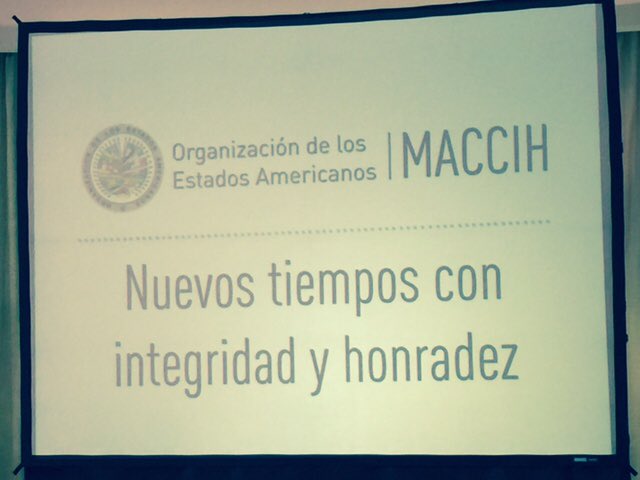By Katharine Valencia
Program Officer at DPLF

Yesterday was an important milestone in the development of MACCIH, the Mission to Support the Fight against Corruption and Impunity in Honduras. Juan Jiménez Mayor, spokesman of the Mission and representative of Organization of American States (OAS) Secretary General Luis Almagro, presented the objectives and scope of the Mission in Tegucigalpa. This follows the January 19 signing of the agreement establishing MACCIH in Washington, DC.
MACCIH is not the United Nations-backed solution that many Honduran and international civil society organizations had called for. As background, a major corruption scandal involving the country’s healthcare system (Instituto Hondureño de Seguridad Social, IHSS) and implicating the President boiled over last summer, giving rise to the Indignados (Outraged) protest movement. The Indignados and their allies at home and abroad demanded the development of a mechanism similar to that in neighboring Guatemala. The International Commission against Impunity in Guatemala (CICIG) has a mandate granting it significant investigatory and prosecutorial powers, and in the past year it has achieved high profile successes, including investigations leading to the resignation and arrest of then-President Otto Perez Molina.
The timing of CICIG’s unprecedented victories gave even more credence to the argument that Honduras needed a similar mechanism. However, Honduras is arguably a victim of CICIG’s success, in the sense that those in power who could potentially be targeted by a strong international mechanism would want to avoid just that. But the calls for change could not be ignored by the ruling class. The result is a compromise – not a UN, but rather an OAS body, with fewer powers than CICIG. In its original incarnation, MACCIH was widely criticized for primarily focusing on evaluations and assessments of the justice system – actions which have already been carried out credibly in recent years without significant implementation of resulting recommendations. In response to these criticisms, the OAS and the Honduran government went back to the drawing board to give more teeth to MACCIH’s mandate. As such, the final version of the international agreement establishing the Mission provides for “active collaboration” between MACCIH and the Honduran authorities “in the prosecution of cases of corruption.” The agreement also envisions an independent civil society observatory tasked with overseeing the implementation of reforms.
Although the final agreement represents an improvement over the original proposal, some of its provisions create ambiguity about what MACCIH can and cannot do. For example, the language establishing the unit for support, supervision and active collaboration (3.1.1 of the Agreement) is meant to “provide technical advice, oversee, and/or evaluate” the Attorney General’s Office, the judiciary, and other government offices. There is a big difference between “providing advice,” which does not necessarily entail more than providing detached commentary and recommendations, and “overseeing,” which implies some sort of managerial authority.
At the presentation yesterday, Juan Jimenez Mayor emphasized that while technical advising will be part of the mission, the principal focus of MACCIH is to work with police, the Attorney General’s office, and the judiciary in the prosecution of emblematic corruption cases. Jimenez also spoke about the need to establish special courts with jurisdiction over corruption cases as soon as possible. Recognizing that Honduras is a dangerous place for human rights defenders, he spoke of the “martyrs” in the fight against corruption and the need to protect the lives of all who advocate for accountability. Jimenez also promised to provide weekly updates to the public about MACCIH’s progress.
But this raises another issue which must be clarified: the application of the controversial Law of Secrets (passed by Congress at the end of 2014 to grant the state broad powers to classify information) to MACCIH’s activities. President Juan Orlando Hernández promised unrestricted access to information about the government during his remarks at the signing of the MACCIH agreement. How will this tension be resolved if the Law of Secrets remains in place?
Whether MACCIH will have a real impact remains to be seen. But its installation yesterday in Honduras offers at least a glimmer of hope that positive changes can begin to take place. Continued pressure and monitoring from civil society, journalists, and international donors will be necessary to ensure that MACCIH reaches its full potential rather than frustrating good-faith efforts in the fight against corruption.

[…] English version […]
Me gustaMe gusta